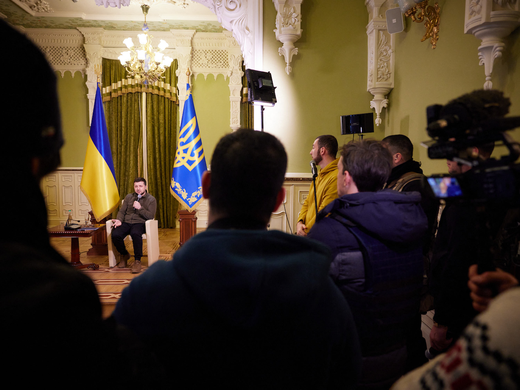There’s no doubt that rising authoritarianism, geopolitical conflict and destabilizing tech companies are imperilling online freedoms worldwide. But civil society groups, media and law makers are simultaneously pushing back, achieving breakthroughs with better legislation, greater awareness of online threats and increased accountability for the platforms themselves.
The result is that, perhaps counterintuitively, optimism about our collective digital future is more warranted now than ever before.
In October, US-based democracy watchdog group Freedom House released its latest annual Freedom on the Net report, which argues that authoritarian actors are fragmenting the internet into a “patchwork of repressive enclaves.” Since June 2021, citizens in at least 53 countries have suffered legal backlashes or been jailed in reprisal for what they’ve posted online.
According to Freedom House’s researchers, the largest crackdown has been in China, where domestic websites and internet platforms are now being strong-armed by government policy into altering their algorithms to promote the hardline ideology of the ruling Chinese Communist Party. China’s government under President Xi Jinping continues to make huge strides in the evolution of its panopticon of state surveillance based on artificial intelligence. And Beijing is exporting these tools abroad.
Other autocratic regimes are stifling online expression as well. This includes Russia — whose war on Ukraine has been supported by the insulation of Russians in a distorted reality shaped by the Kremlin’s domestic propaganda machine. It also includes Myanmar, Sudan, Venezuela, Vietnam and others.
In Ethiopia, a peace agreement signed in early November between the central government and rebel forces from northern Tigray has for now halted one of the worst wars of the twenty-first century. Yet the war crimes committed by both sides may be impossible to ever prosecute thanks to the last two years of fighting being waged under an internet blackout of Tigray ordered by Prime Minister Abiy Ahmed. This will likely seed a poisonous political legacy from the conflict lasting years, if not decades.
Turkey’s government responded to a deadly bombing in central Istanbul on November 13 by banning independent domestic reporting of the blast and cutting off access to social media. The incident provided the first big test case of a draconian censorship law passed a month earlier by the ruling Justice and Development Party, which threatens up to three years of jail time for anyone found guilty by Turkey’s government of posting content deemed “fake news.”
Indeed, according to an internet shutdown tracker compiled by the Netherlands-based virtual private network provider Surfshark, and NetBlocks, an independent internet-monitoring organization, governments in 76 countries to date have deprived citizens of internet and social media access as a means of social control — primarily to silence dissent and curb civil unrest.
Either way, human rights advocates worry that Musk’s dismantling of Twitter’s hard-fought content safeguards will imperil activists as well.
The physical building blocks of digital spaces are also being targeted as part of geopolitical struggles. Russian cyberattacks meant to knock Ukrainian telecom systems offline or attempts to shell them into oblivion have left Ukraine’s internet uncomfortably reliant on Elon Musk’s Starlink network of low Earth orbit satellites. Musk — one of the world’s richest men — is beginning to bristle at the cost of providing Starlink’s services to Ukraine at a discount. After successfully testing anti-satellite weapons in November 2021, the Kremlin has warned that commercial Western satellites could become a “legitimate target” as part of its military strikes against Ukraine.
Elsewhere, Taiwan plans to invest millions of dollars over the next few years in protecting its undersea internet cables and mobile base stations to defend against any Chinese attempt to invade and conquer the democratic, self-governed island.
Then there is the mounting financial turmoil and organizational uncertainty plaguing large tech platforms, particularly Facebook and Twitter, which wield enormous global power over how news spreads and opinions are shaped.
Meta CEO Mark Zuckerberg on November 9 announced 11,000 layoffs at Facebook after its third-quarter earnings report highlighted Meta’s plummeting valuation; the company’s worth dropped by around two-thirds between January and December this year. Some of this stems from investor concerns about Zuckerberg’s apparent isolation and growing disinterest in his own platform, as he directs his attention and Meta’s resources to the moonshot effort of making the metaverse a reality.
At Twitter, Elon Musk, a self-described “free speech absolutist,” has become an unlikely arbiter of internet freedom through his US$44 billion purchase of the platform. Some observers suspect the acquisition is driven by his desire to replicate China’s omni-functional super app WeChat. Musk’s tenure at the head of the world’s digital town square has so far entailed firing Twitter’s content-moderation brain trust, crushing workforce morale, suspending the accounts of journalists and propelling the platform — a de facto internet archive — toward possible collapse, given the flight of some of its biggest advertisers and key staff.
More likely, says technology commentator Parmy Olson, is that Twitter may simply morph into a streamlined, content-agnostic platform akin to Telegram. Some high-profile users and advertisers will leave, but “many others will stay, and reconcile themselves with sitting alongside anti-vax influencers and holocaust deniers.”
Either way, human rights advocates worry that Musk’s dismantling of Twitter’s hard-fought content safeguards will imperil activists as well. One of those advocates is UN High Commissioner for Human Rights Volker Türk, who wrote in an open letter to Musk on November 5 that “Twitter has much to offer to our common agenda for a better world, but we need to be clear-eyed as to what is required to make that reality.”
Ron Deibert, director of the Citizen Lab at the University of Toronto, has suggested that authoritarian state actors will henceforth be able to target users more easily, because under Musk “it’s as if the defences of this already weak platform have suddenly been dropped.”
Indeed, in response to anti-government protests in China at the end of November, state-run bot accounts on Twitter drowned out demonstrators’ posts in key cities like Beijing and Shanghai by launching fake mass advertising campaigns micro-targeting users near protest sites.
Yet amid these alarming trends, a path is nevertheless emerging that can lead to not only the preservation of global internet freedoms but also their expansion.
Freedom House notes how civil society actions managed to enhance internet freedoms in more than two dozen countries from June 2021 to May 2022 — the highest year-on-year rise since the group started tracking this metric in 2009. Case studies and proven strategies therefore exist for how to mitigate illiberal uses of technology, both foreign and domestic, as well as the social pathologies increasingly produced by online activity.
The general framework involves four pillars, according to Freedom House, beginning with pressuring tech companies to protect users and resist unreasonable state demands. Courts must be petitioned to intervene against government censorship and surveillance as well, while electoral support is mobilized for candidates keen on increasing digital rights through improved policies. Democratic countries must also embrace their role as vanguards capable of outlining a positive vision for the internet’s future at multilateral fora.
Social media spaces, despite their glaring flaws, still offer their users an unrivalled capacity in catalyzing democratic organization.
The potential upshot of these actions is reflected in the European Union’s implementation of both its 2018 General Data Protection Regulation (GDPR) and its Digital Services Act (DSA), the latter having entered into force on November 16. Critics have rightfully pointed out how the GDPR has fallen short and why the DSA is not perfect. But these defects should not detract from their value as templates for other jurisdictions to adapt and improve upon.
And social media spaces, despite their glaring flaws, still offer their users an unrivalled capacity in catalyzing democratic organization. Citizens have deployed these platforms’ powerful reach in the continuing women’s rights protests in Iran that have rattled the country’s theocratic dictatorship. Similar pro-democracy movements coalescing online in Brazil this year helped deny authoritarian populist president Jair Bolsonaro another term as president, and in the United States helped defeat dozens of far-right candidates in the 2022 mid-term elections.
Increasingly, conversations are also taking place around whether social media as a medium has hit an inflection point. One where a critical mass of users, businesses and governments — many of whom entrust their critical communications infrastructure to these privately owned platforms — all demanding change sparks an overdue evolution in platform format and, perhaps some day, ownership, opening up a greater role for civil society.
In writing about Twitter, but with sentiment that can be equally applied to numerous platforms, New York Times columnist Ezra Klein says that “put simply, Twitter’s value is how easy it makes it to talk. Its cost is how hard it makes it to listen. It is a failure of imagination to think that our choice is the social media platforms we have now or nothing.”
All told, while there is plenty of evidence that online freedoms are being eroded globally, there are also encouraging signs that a more open and inclusive digital future is possible.



